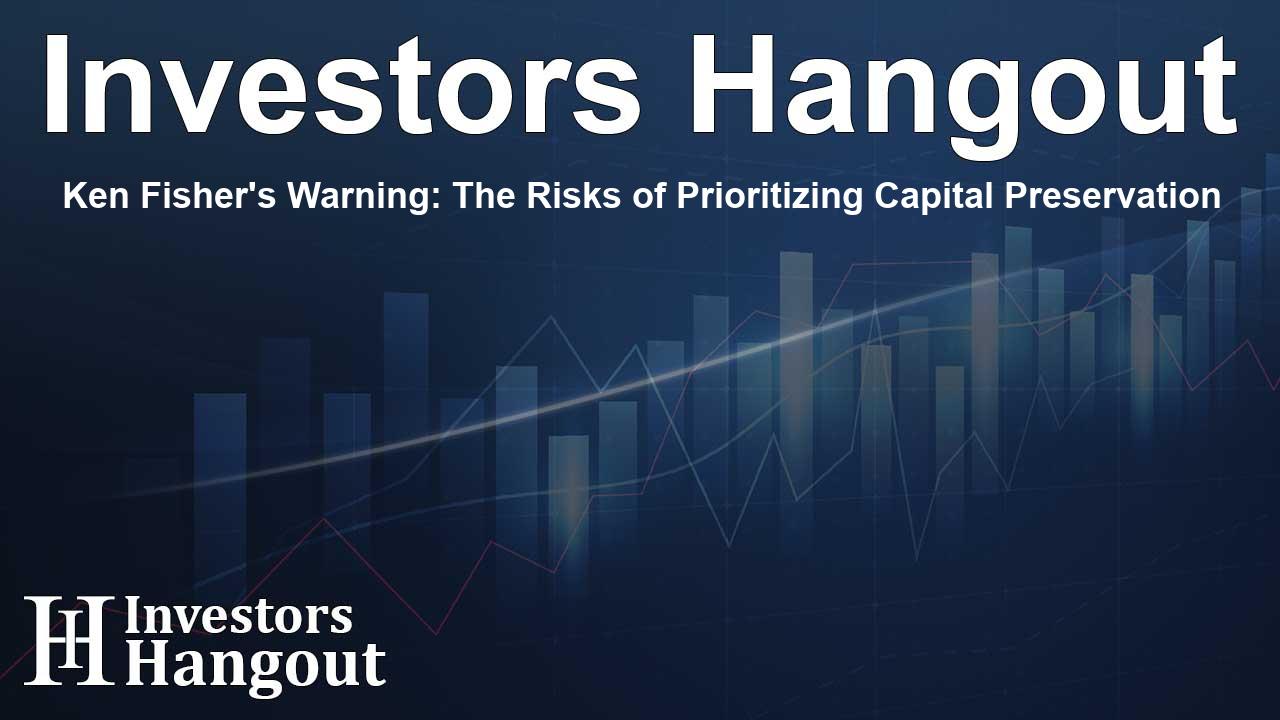Ken Fisher's Warning: The Risks of Prioritizing Capital Preservation

Understanding the Risks of Capital Preservation
Renowned investor Ken Fisher has a crucial message aimed at retirees and those preparing for retirement. He warns that the fixation on "capital preservation" might be leading you towards financial disappointment.
The Compromise Between Security and Growth
Fisher, known for his straightforward investment philosophy, recently expressed in an opinion piece that capital preservation, often portrayed as a safe strategy for retirement funds, is in direct conflict with the necessary growth to maintain a comfortable retirement lifestyle.
He elaborates that investment strategies regarded as "safe" frequently fail to keep pace with inflation. This shortfall can gradually erode purchasing power, ultimately rendering retirement savings less effective over time.
Volatility: A Key to Long-Term Growth
Central to Fisher’s argument is the function of market volatility in achieving long-term success. While many view market volatility as a danger, he asserts that it is essential for fostering growth. Historical data shows that U.S. stocks have had positive returns in over 63% of months and approximately 73.5% of years from 1925 to 2023.
The Fallacy of Striving for Zero Risk
Fisher provocative states that attempting to fully eliminate market fluctuations leads to extremely low returns—often failing to even match inflation rates. He describes investment plans that promise both growth and capital preservation as a hoax.
Beware of So-Called Safe Investments
He emphasizes that many financial products that advertise growth alongside capital protection should be approached with skepticism, calling them misleading. Fisher articulates that these strategies are not only unrealistic but can also detract from achieving true financial independence.
A Call to Reassess Investment Strategies
In the current economic environment, where many retirees face uncertainty and fluctuating markets, Fisher's insights hold significant relevance. He advises a clear understanding of financial goals, personal savings rates, and anticipated spending plans rather than merely seeking stable investment returns.
Adapting to Financial Realities
Fisher stresses that while the desire for safety is understandable, overemphasizing capital preservation can be detrimental in the long term. Those averse to market volatility may need to reconsider their financial aspirations and investment approaches to align with the realities of market behavior.
Looking Ahead: Planning for Financial Security
As the cost of living escalates and the horizon of retirement extends, Fisher’s perspective highlights the importance of embracing volatility as part of the journey towards financial growth. Understanding that every investment strategy carries risk is fundamental to achieving sustained success.
Frequently Asked Questions
What does capital preservation mean in investing?
Capital preservation refers to investment strategies aimed at maintaining the initial amount of capital, often prioritizing safety over growth.
Why does Ken Fisher oppose capital preservation?
Ken Fisher argues that focusing solely on capital preservation can hinder growth potential and doesn't keep pace with inflation.
What is market volatility?
Market volatility describes the degree of variation in the price of a financial asset over time, often linked to risk and investment returns.
How does inflation affect retirement savings?
Inflation diminishes purchasing power, meaning that fixed amounts saved may become less valuable in the future if returns do not exceed inflation rates.
What should investors consider for long-term growth?
Investors should be prepared to embrace some level of market volatility and critically assess their investment strategies to achieve sustained growth.
About The Author
Contact Owen Jenkins privately here. Or send an email with ATTN: Owen Jenkins as the subject to contact@investorshangout.com.
About Investors Hangout
Investors Hangout is a leading online stock forum for financial discussion and learning, offering a wide range of free tools and resources. It draws in traders of all levels, who exchange market knowledge, investigate trading tactics, and keep an eye on industry developments in real time. Featuring financial articles, stock message boards, quotes, charts, company profiles, and live news updates. Through cooperative learning and a wealth of informational resources, it helps users from novices creating their first portfolios to experts honing their techniques. Join Investors Hangout today: https://investorshangout.com/
The content of this article is based on factual, publicly available information and does not represent legal, financial, or investment advice. Investors Hangout does not offer financial advice, and the author is not a licensed financial advisor. Consult a qualified advisor before making any financial or investment decisions based on this article. This article should not be considered advice to purchase, sell, or hold any securities or other investments. If any of the material provided here is inaccurate, please contact us for corrections.
